While the risk society is a secular phenomenon, it provides an opportunity for Christians to live distinctively and attractively.
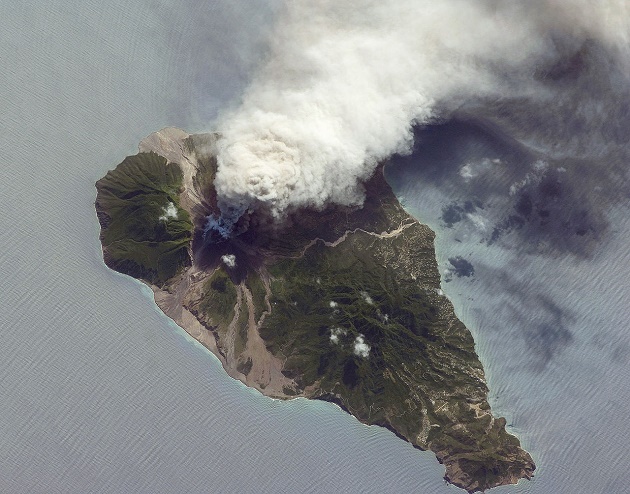 View from the International Space Station of Montserrat’s active volcano.
View from the International Space Station of Montserrat’s active volcano.
Yes, I to the end shall endure,
as sure as the earnest is giv’n;
more happy, but not more secure,
the glorified spirits in heav’n.
Augustus M. Toplady
For the sake of economic survival, individuals are now compelled to make themselves the centre of their own life plans and conduct.
Ulrich Beck[1]
SUMMARY
Risk has become a central concept in modern life. The ‘risk society’ that we live in has increasingly structured itself around attempting to manage an uncertain future, in which more knowledge simultaneously provides safety and increases our awareness of what we do not know. We make ‘risk decisions’ every day about our money, cycling to work, what we include in our diet. We have an overwhelming and sometimes apparently contradictory volume of knowledge at our disposal that may aid, but can obfuscate, our decisions. The proliferation of science and technology has provided much of this knowledge, but it has also created new risks, from nuclear reactors to nanobots to processed food. This paper argues while the risk society is a secular phenomenon, it provides an opportunity for Christians to live distinctively and attractively.
THE RISK SOCIETY: SCIENCE, TECHNOLOGY AND SOCIAL STRUCTURE
Introduction: knowing risk
In 1986, at the time of the Chernobyl incident, German sociologist Ulrich Beck wrote a hugely influential book entitled Risk society: Towards a new modernity. In this and subsequent works, Beck advanced the thesis that the modern world is increasingly structured around the management of risk – particularly risk that has been generated by the process of modernisation itself. An obvious example of this is climate change: industrialisation and technological advancement have not only increased risk to the climate by producing excessive greenhouse gases, but the process of modernisation has itself then had to be adjusted in order to mitigate that risk – so there is now a lot of funding for the development of ‘green’ technologies. In the process that Beck calls ‘reflexive modernisation’, we unknowingly create – and indeed imagine – new risks and then we have to factor them as we advance, frequently with a great deal of controversy that is heavily value-laden.[2]
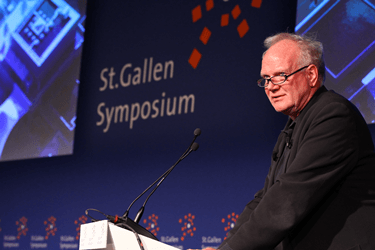 Ulrich Beck, author of The Risk Society, speaking in 2012.
Ulrich Beck, author of The Risk Society, speaking in 2012.In addition to the production of new technological risks, scientific exploration is rapidly increasing our knowledgeabout the threats we face, natural, anthropogenic and hybrid:[3] examples might include geological investigations of past disasters and epidemiological studies of factors that affect the provenance of disease. We are continually bombarded with information about what is good for us and what is not; what is likely to increase our risk of ill health; what we should invest in and plan for. A great deal of research is focused on calculating, discovering and understanding risks so that they can be controlled – often with considerable inequality, however, as richer nations have much greater resources for this.
The symptoms of the risk society: risk institutions and instruments
Beck’s fundamental thesis about the increasing role of risk management in the fabric of society is widely accepted in the social sciences, and the term ‘risk society’ to describe this increased tendency to try to manage risk is now widespread. Sociologist of science Sheila Jasanoff observes that risk has become a major ‘organising concept’ in Western society: from health and safety regulation and scientific advisory groups to the insurance industry, a great many institutions are focused on reducing risks.[4] These institutions deploy a range of tools to try to distribute risk and bring it under control through assessment and management.
A major instrument of this is probability: probability provides a means of taming risk – putting numbers on it and thereby implying that we understand it and can control it. Philosopher Ian Hacking has tracked the emergence of the concept of probability since the early Enlightenment: prior to the mid-seventeenth century, there was no such concept.[5] Modern society, by contrast, places enormous ‘trust in numbers’[6], from insurance calculations to epidemiological studies. There has also been huge investment in the production of models that try to impose some kind of order on an uncertain future. Models, however, inevitably simplify the world, and are better capable of representing some processes than others – extreme events are difficult to model, and data is invariably limited to things that have already happened rather than the ‘black swans’ that may occur in the future.[7] Risk assessment is frequently dominated by uncertainty: while the probability of an event can sometimes be calculated, more often than not there is a high level of uncertainty and indeed ignorance on that calculation.[8] Indeed, Beck argues that the risk society is characterised by ‘incalculable’ risks.
The effects of living in the risk society are pervasive. One is the growth of litigation, as people seek to apportion blame for risks that were managed badly. A recent and extreme example of this would be the court case against six Italian scientists (and a public official) charged with negligent manslaughter following the L’Aquila earthquake in Italy in 2009.
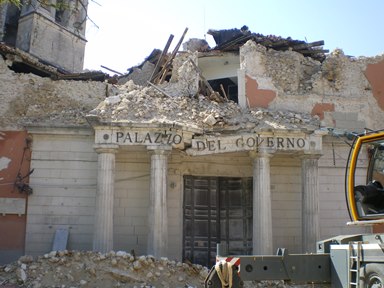 L’Aquila earthquake in 2009. / TheWiz83
L’Aquila earthquake in 2009. / TheWiz83This case was complicated by issues of risk communication and political tensions,[9] but was also characterised by the human desire to attribute blame and by the expectation that those in positions of authority in a government or on an expert panel have a responsibility to protect people. This expectation that governments should protect citizens is another symptom of the risk society, and has resulted in a proliferation of regulation and legislation – from food and drug regulation to civil contingency planning and the wide range of taxes that seek to protect us from ourselves. Indeed, the way that we live or are told to live is increasingly dependent on how we measure up – often as individuals in comparison with the ‘norm’.
RELIGION IN THE RISK SOCIETY
Beck states that ‘Risk makes its appearance on the world stage when God leaves it’: there is a strong association between the rise of ‘risk’ and the rise of secularism. The risk society is not a Christian society. It is a society with a different ontology: risk is part of the fabric of the universe but we can, through human knowledge, ‘manage’ it. It deploys calculation as a means of reducing fear through the impression that risk is being controlled – the aim of the risk society is to minimise anxiety and create a secure future, in part because of the fear of death. The problem, however, is that many of the risks are not calculable, and the continual drive to calculate risk anyway significantly adds to fear of the future: risk occurs when people feel insecure about something. Anthony Giddens, another key risk theorist, wrote that:
Risk is the mobilising dynamic of a society bent on change, that wants to determine its own future rather than leaving it to religion, tradition or the vagaries of nature. Modern capitalism differs from all previous forms of economic system in terms of its attitude towards the future… Modern capitalism embeds itself into the future by calculating future profit and loss, and therefore risk, as a continuous process.[10]
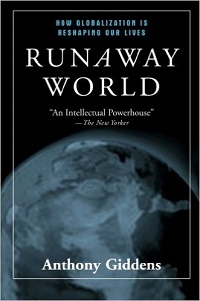
Giddens was writing prior to the recent global economic crisis! Nevertheless, his points do show the great extent to which modern society both differs from traditional and pre-capitalist societies and has moved, in its basic structure, away from Christian values as it focuses on reducing risk: the right to self-determination (apart from God) has become central, and human inability to know the future therefore becomes a major challenge. He goes on to argue that while risk had been initially a means of ‘regulating the future, or normalising it and bringing it under our dominion’, in reality ‘it hasn’t worked out that way’. This is predominantly due to the rise of ‘manufactured’ risks that elude calculation. He puts forward two conclusions – that this will ‘inevitably breed religious revival… which turn[s] against science’ and that it will be important to engage with science more actively than societies have in the past. In the risk society, human knowledge and reason are the pinnacle of existence.
In his 2006 article, Beck looks in detail at the relationship between religion and risk, declaring that ‘Whoever believes in God is a risk atheist’:
Risks presuppose human decisions… Someone… who believes in a personal God has at his disposal a room for manoeuvre and a meaning for his actions in the face of threats and catastrophes… There is, therefore, a close connection between secularization and risk. When Nietzsche announces: God is dead, then that has the – ironic – consequence that from now on human beings must find (or invent) their own explanations and justifications for the disasters which threaten them.[11]
This highlights the predicament of non-believers: it is hard work finding explanations and justifications for every consequence of risky decisions, whether that means building oneself or others up for a ‘good’ decision, or blaming oneself or others for a bad one. Christian faith does not remove responsibility for our decisions, but it ultimately provides relief from both our sin and from the angst of feeling that our whole life has been deflected by a single choice. We can find contentment because we know that ultimately, God is in control. This faith is countercultural in a risk society.
CHRISTIAN PERSPECTIVES ON THE RISK SOCIETY
There was a fascinating exchange between Rousseau and Voltaire following the Lisbon earthquake of 1755 – at a key point in the development of Enlightenment thinking. While Voltaire thought that the earthquake demonstrated that God does not care, Rousseau offered what Dynes (2000) refers to as ‘the first truly social scientific view of disaster’:[12]
It was hardly nature who assembled there twenty-thousand houses of six or seven stories. If the residents of this large city had been more evenly dispersed and less densely housed, the losses would have been fewer or perhaps none at all… But many obstinately remained … to expose themselves to additional earth tremors because what they would have had to leave behind was worth more than what they could carry away. How many unfortunates perished in this disaster through the desire to fetch their clothing, papers, or money?[13]
He further asks, ‘Will we say that the order of the world must change to suit our whims, that nature must be subject to our laws, that in order to prevent an earthquake in a certain spot, all we have to do is build a city there?’ Voltaire’s problem is with trusting a God who allows things like Lisbon to happen. Rousseau emphasises that most of the consequences of Lisbon were of human making, and also that the natural system behaves in a way that is intrinsic to its nature, and we cannot expect it to do otherwise in a fallen world. After all, the creation is groaning.[14]
Christians recognise that we are finite in both time and space: we do not know the future and we live in a fallen world where the Earth system behaves as it was created to behave. Rousseau went on to emphasise the difference that hope in eternal life makes to one’s perspective on this world (‘hope beautifies everything’). The debate between Voltaire and Rousseau is symptomatic of a fundamental clash of perspectives. The risk society is explicable as a manifestation of the ontological uncertainty that non-believers face, and their subsequent dependence on human knowledge as a solution – but one that never fully succeeds. For a non-believer, there is a genuine risk of annihilation because of uncertainty about what happens after death – risk is real and ultimate. For Christians, risk is epistemological, merely a function of our limited creatureliness. We take ‘risks’ when we step out in faith because we do not know the future, but we do so in dependence on God, and knowing that ultimately, we are safe. We are surrounded by the risk society, but our actions are not governed by it.
Jesus said, ‘You will be betrayed even by parents, brothers and sisters, relatives and friends, and they will put some of you to death. Everyone will hate you because of me. But not a hair of your head will perish. Stand firm, and you will win life.’[15]
This passage juxtaposes the world’s view – that of fearing death – with the Christian view – winning life.[16] The Christian worldview provides a radically different perspective on suffering and all the other evils which the ‘risk society’ tries to secure us from, because it provides a hope which allows us to invest ourselves not in the things of this life, but in eternity. We have unchanging promises in a rapidly changing world.
We live in a society that has constructed itself in a way that uses knowledge to try to protect itself from an unknown and unknowable future. But Christians are at ease with the future, without being fatalistic. It is deeply countercultural, and potentially powerful as we engage with the world around us.
CHRISTIAN DISTINCTIVENESS
This section expands on the implications of the risk society for Christians. It addresses two areas that arise out of the discussion so far. First, it examines some examples from the Bible that give us some ideas about how to manage knowledge about risks. Christians are not called to be fatalistic – we have responsibility for our decisions, under God and in light of the knowledge he has given us. The paper then considers the challenge of planning ahead, and finally looks at risk and relationships in the Kingdom of God.
Risk and knowledge
What does the Bible have to say about the relationship between risk and knowledge? In Ezekiel 33, the Lord appoints Ezekiel as a watchman for the people, and outlines the attribution of blame in this context. He charges the watchman with warning the people when he sees the sword coming – if he does not warn them, their blood is on his hands. Conversely, though, if he warns them and they do not respond with action, then their blood is on their own hands. While this is written in a particular context, it shows that there is a culpability in failing to act on knowledge about a risk, and that the people of God do, within their frame of reference, experience risk in the epistemological sense.[17] Do we then trust God to protect us from the hurricane, or do we take measures to protect ourselves? Of course we take measures to protect ourselves and do so in dependence on God. Knowledge is a gift from God, not a challenge to his sovereignty. It only becomes a challenge to his sovereignty when we accord it too much authority – something that Isaiah warns against.[18] We are called to use knowledge both to guide our own decisions, and to help others. This is also demonstrated, for example, in Paul’s handling of the shipwreck in Acts: he warns the sailors, and then deals graciously with them when they ignore him.[19]
Christianity is not opposed to science in the way that Giddens (with no evidence) suggests. To give an example, during the volcanic eruptions on Montserrat from 1995, there were various attempts to understand how God was working – why was the island being devastated? A few people did take the view that they would resist evacuations because God would protect them. This was the narrative that most non-Christian scientists repeatedly referenced. However, the vast majority of the population, led by Christian pastors, realised that God had sent scientists and disaster managers to help them, and that they should listen to their advice. Science is about understanding God’s universe – general revelation. One implication of the risk society for Christians is that we can – and should – engage with science as a gift from God that can inform our choices and our understanding of his world. [20]
Risk and planning
Although the concept of ‘risk’ is a modern one in many respects, there are plenty of biblical passages that refer to risk implicitly and provide examples of management and planning. In Numbers 14, the promise of God seems too good to be true, and out of fear, the Israelites resist it. There are also many examples of anguished decision-making in the context of perceived risk in the Old Testament, such as the men with leprosy at the city gate during the Aramean siege: ‘If we say, “Let us enter the city,” the famine is in the city, and we shall die there. And if we sit here, we die also. So now come, let us go over to the camp of the Arameans. If they spare our lives we shall live, and if they kill us we shall but die.’[21]
In this case, the men were in a desperate situation and made a logical decision, albeit heart-rending. They were also key in the outworking of God’s plan – that the Aramean camp be found empty and plundered. They did not know that, however. Similarly, Joab, in 2 Samuel 10 combines planning ahead with trust in God: ‘Joab said, “If the Arameans are too strong for me, then you are to come to my rescue; but if the Ammonites are too strong for you, then I will come to rescue you. Be strong, and let us fight bravely for our people and the cities of our God. The Lord will do what is good in his sight.”’[22]
It is not wrong to try to figure out what will happen as a consequence of our decisions and to be sensible in arranging contingencies. At the same time, for a Christian, those contingencies are not to be the source of our security – God is. Thus, Esther tells Mordecai: ‘Go, gather together all the Jews who are in Susa, and fast for me. Do not eat or drink for three days, night or day. I and my attendants will fast as you do. When this is done, I will go to the king, even though it is against the law. And if I perish, I perish.’[23]
Esther takes the risk of going to the King, but only after she has prayed. Similarly, in Nehemiah 4, the builders are warned of the risk of attack and respond first with prayer, and then with taking up arms while they continue the building work. They are realistic – they know that there is a risk of an attack – but they put God ahead of their fear.
A striking feature of some of the passages above is that Esther and Joab are decisive – they take time to plan, but they also get on with it. We can agonise too much:
Whoever watches the wind will not plant;
whoever looks at the clouds will not reap.
As you do not know the path of the wind,
or how the body is formed in a mother’s womb,
so you cannot understand the work of God,
the Maker of all things.[24]
We live in an economy of knowledge that depends on knowledge and idolises it in spite of experience. We can spend too much of our time trying to forecast the future, and not enough on action in the present. We are called to humility about our ability to plan ahead.
Now listen, you who say, ‘Today or tomorrow we will go to this or that city, spend a year there, carry on business and make money.’ Why, you do not even know what will happen tomorrow. What is your life? You are a mist that appears for a little while and then vanishes. Instead, you ought to say, ‘If it is the Lord’s will, we will live and do this or that.’ As it is, you boast in your arrogant schemes. All such boasting is evil.[25]
We should approach our future with humility, planning for the future in dependence on God. We actually take spiritual risks when we do not depend on God, and the presence of uncertainty about the future is an opportunity to trust God, rather than a source of fear.
One particular area that is relevant here is dedicated Christian mission. It can be difficult for Christians to decide whether or not to take the risk of uprooting and going to another country, potentially one that is less ‘safe’. The Bible is clear both on taking risks for God and on being responsible: there can be a form of risk-taking that is actually a manifestation of a kind of spiritual pride – deliberately choosing the most dangerous place possible to show how faithful we are. Jesus did not jump off the temple![26] However, if we look at the passages above, we see that Christians should be willing to take risks in God’s service; and many of those who take such risks in Scripture do so in consultation with wise peers and through prayer.
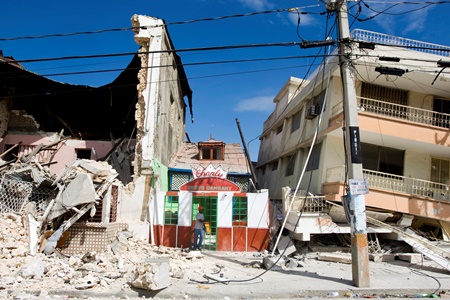 Haiti earthquake damage. / Marco Dormino/UNDP
Haiti earthquake damage. / Marco Dormino/UNDPRisk and relationship
In the social science of disasters, it is widely accepted that a natural hazard progresses to a disaster in large part as a result of human failures. It is therefore not surprising that 80 per cent of life years lost in disasters are lost in low and middle-income countries, for example:[27] human inequality and greed are primary drivers. In 2010–11, there were several large earthquakes. The largest was the March 2011 earthquake in Tohoku, Japan. It produced a tsunami that killed 15,891 people, with 2,500 still missing. The earthquake itself killed very few people – Japanese earthquake engineering is very effective, while tsunami modelling is less advanced. In 2010, an earthquake that was more than two orders of magnitude smaller caused 250,000 deaths in Haiti. This was an outworking of knowledge and resource inequalities – buildings in Haiti were not engineered against earthquakes, corruption was rife, and scientific knowledge of faultlines in Haiti was not as developed as that in Japan. Many of the deaths – and the subsequent suffering of people living in tent cities with poor sanitation – were entirely preventable. Human inequality, injustice and selfishness are (nearly) always major factors in disaster. Disaster risk reduction focuses on understanding social vulnerability for precisely this reason – it has been recognised since at least 1755 that disasters are made of human ills. This view was revived in the twentieth century in the work of Gilbert White, who wrote in 1945 that ‘floods are “acts of God”, but flood losses are largely acts of man’, and has become the dominant view in international disaster risk reduction. Efforts are focused, therefore, on reducing inequality and vulnerability, recognising that it is the breakdown of human relationships that is part of the problem. What is sadly lacking, however, is an acceptance of sinfulness – the broken relationship with God. Risk is a direct result of the fall: Adam and Eve’s first response was to feel insecure about not being clothed. It is a matter of perspective. Ultimately, Christians respond to risk with relationship – with God, with one another, and with the risk society itself.
This is a sentiment that is displayed beautifully in John 21, when the disciples are fishing. They are fishermen – they are experts in catching fish. Jesus, on the other hand, was a carpenter. They obeyed him when he told them to move the nets because they knew who he was: they had a relationship with him and they trusted him. This does not negate their knowledge of fishing – but it suggests that knowledge is partial: sometimes, the usual best place for the nets does not provide fish. There are any number of possible physical explanations for that, and it is a scenario that natural scientists can resonate with! What we learn from the episode in John echoes much of the ‘Black Swan’ literature: even the very best experts can be wrong – but we know the One who does know everything. Indeed, social psychologists have shown that our attitudes to risk often depend on who we trust. This is particularly important when we are very uncertain about a risk – we do not even know how big it is or whether we should be worried about it. At this point, perception is very important. As Christians we have a radical approach – we trust God over and above anything, and we use the gifts of knowledge he has given us under his sovereignty. Faith is the counter to risk: ‘Now faith is confidence in what we hope for and assurance about what we do not see.’[28] Risk is ‘what we do not see’ – something that frightens the risk society, and that is why there is so much focus on trying to manage the future.
In contrast to the risk society, Christians believe that the focus of our lives should be serving God and others rather than minimising our worry or even avoiding death – Jesus was not free of worry in Gethsemane. The cross has secured our future. The church therefore provides an antidote to risk through relationships – relationship with God and with each other. Relationship is at the heart of a Christian society in a way that it cannot be in the risk society and in a way that transcends ideological differences – neither the state (socialism) nor financial wealth (capitalism) can meet the deepest human needs. Furthermore, the contentment that Christians find in their relationships is much deeper than any relief from anxiety and uncertainty that risk management can provide. The prevalence of fear in the modern world – hidden though it sometimes is behind the complex risk mitigation technologies that surround us – is an immense opportunity for Christians both to engage with the issues that drive the fear and to demonstrate that we live with a fundamentally different and eternal perspective.
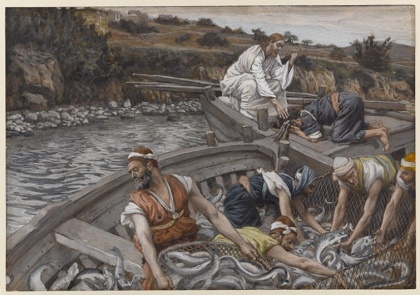 James Tissot, The miraculous draught of fish. / Brooklyn Museum
James Tissot, The miraculous draught of fish. / Brooklyn Museum
CONCLUSION
Modern society in Western democracies has become increasingly organised around risk. The ‘traditional’ structures of society – including the family – have been worn down through individualisation and the forming of different kinds of social network, many of which seek to make the future safe. Ironically, however, the biggest risk of all is the spiritual risk of not trusting in God.[29] Christians have a responsibility, through evangelism, to address that risk. However, we can also exemplify the radically different society that we experience in the church – one that is characterised by relationship with God and with one another. Instead of objectifying people – as statistics, for example – we value people as subjects. We also have a phenomenal freedom that inhabitants of the risk society lack – we can take what the world might view as ‘risky’ decisions in dependence on God. The Christian life in the risk society is a radical one. The risk society reminds us of what we have in Christ, and the opportunity we have to serve others, both in using knowledge wisely and in witnessing to the sovereignty of God that neutralises uncertainty and risk in our lives.
Amy Donovan is lecturer in Geography and Environmental Hazards at King’s College London.
This article first appeared on the Jubilee Centre website and was republished with permission.
Notes
[1] Risk Society: Towards a new modernity, London: Sage, 1992, p.92.
[2] Mike Hulme’s book, Why We Disagree About Climate Change (Cambridge University Press, 2009), offers a fascinating analysis of the role of values and belief in understanding the climate change discourse.
[3] A hybrid risk, or ‘na-tech’ risk, occurs when a natural hazard combines with an anthropogenic one and impacts a population. Examples include the threat of volcanic ash to aviation, and the Fukushima nuclear disaster following the Great East Japan Earthquake and Tsunami in 2011.
[4] S. Jasanoff, ‘The songlines of risk’. Environmental Values 8(2), 1999, pp.135–152.
[5] I. Hacking, The Emergence of Probability: A philosophical study of early ideas about probability, induction and statistical inference, Cambridge University Press, 1975. See also I. Hacking, The Taming of Chance, Cambridge University Press, 1990.
[6] An interesting analysis of this is given in: Theodore Porter, Trust in Numbers: The pursuit of objectivity in science and public life, Princeton University Press, 2004.
[7] N. N. Taleb, The Black Swan: The impact of the highly improbable, New York: Random House, 2007.
[8] For example, a risk report regarding volcanic activity on Montserrat once gave a probability of an event at 46%, but an uncertainty range of 5–87%. This makes one wonder what the point is.
[9] See for example S. Hall, ‘Scientists on trial: At fault?’, Nature 477, 2011, pp.264–9.
[10] Runaway World: How globalization is reshaping our lives, London: Profile Books, 1999, p.24.
[11] Ulrich Beck, ‘Living in the world risk society: A Hobhouse Memorial Public Lecture given on Wednesday 15 February 2006 at the London School of Economics’, Economy and Society, 35:3, 2006, pp.329–45.
[12] Russell R. Dynes, ‘The Dialogue between Voltaire and Rousseau on the Lisbon Earthquake; The emergence of a social science view’, International Journal of Mass Emergencies and Disasters, 18:1, 2000, p.106.
[13] Rousseau to Voltaire, 18 August 1756.
[14] Rom. 8:18–22.
[15] Luke 21:16–19.
[16] See also Col. 3:1–4.
[17] John Piper deals with this sort of risk in Risk is Right: Better to lose your life than to waste it, Crossway Books, 2013.
[18] Isa. 47:7–15.
[19] Acts 27.
[20] For a detailed discussion, see Denis Alexander, ‘Science: Friend or foe?’ Cambridge Papers, September 1995.
[21] 2 Kgs 7:4.
[22] 2 Sam. 10:11–12.
[23] Esther 4:16.
[24] Eccles. 11:4–5.
[25] Jas 4:13–16.
[26] Luke 4:9–12.
[27] UN International Strategy for Disaster Reduction, Global Assessment Report 2015. www.preventionweb.net/english/hyogo/gar/2015/en/home/index.html
[28] Heb. 11:1; cf Rom. 8:24–5.
[29] Matt. 10:28.

Las opiniones vertidas por nuestros colaboradores se realizan a nivel personal, pudiendo coincidir o no con la postura de la dirección de Protestante Digital.
Si quieres comentar o